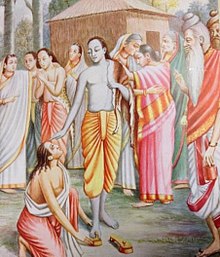Paduka Sahasra
| Paduka Sahasra | |
|---|---|
 Painting of the paduka (sandals) of Rama. | |
| Information | |
| Religion | Hinduism |
| Author | Vedanta Desika |
| Language | Sanskrit |
| Verses | 1000 |
The Paduka Sahasra (Sanskrit: पादुकासहस्रम्, romanized: Pādukāsahasram) is a Sanskrit stotrakavya (eulogistic poem) written by the Hindu philosopher Vedanta Desika in the 14th century CE. Comprising one thousand verses,[1] the subject of the poem are the paduka (sandals) of the deity Ranganatha of Srirangam, a form of Vishnu. The verses of the poem extol and associate these sandals with those of Rama, the protagonist of the Ramayana.[2] The poem is regarded to be one of Vedanta Desika's greatest works.[3]
Etymology
In Sanskrit, pādukā refers to sandals or footwear and sahasra means thousand. The Paduka Sahasra is translated as the, "thousand verses on the sandals" of Ranganatha.[4][5]
Legend
| Part of a series on |
| Vaishnavism |
|---|
 |
According to Sri Vaishnava tradition, the 1,000 verses of the Paduka Sahasra were composed in a single night by Vedanta Desika as a part of a literary contest. By doing so, the poet defeated Alagiya Manavala Perumal, a theologian of the Tenkalai sect, who had only been able to compose 300 verses during the allotted period.[6][7]
Content
A central theme of the Paduka Sahasra is prapatti, the Vaishnava concept of complete surrender to God. The poet also explores the monism as expressed by the Vishishtadvaita philosophy. The initial paddhatis (anthologies) of the work draw inspiration from the Ramayana of Valmiki, reflecting its poetry and philosophy in its verses. The episode of Bharata receiving the sandals of his brother Rama to place them upon the throne of Ayodhya to begin his regency is conceived as the crux of the epic, interpreted with great spiritual significance. The sandals are construed as the perfect symbolism of divinity.[8]
Hymn
Desika offers a poetic description of the sandals in one of his verses:[9]
surabhi nigama gandhā saumyapadmākarasthā kanaka
kamalinīva prekshyasē pādukē tvam
bramara iva sadhā tvām prāptha nānā vihāraḥ
shathamakha maṇinīlaḥ sēvathē sāraṅgadhanvā— Paduka Sahasra, Verse 743
O sandals, having the perfume named the Vedas and residing in the beautiful lotus pond, you are effulgent as a golden lotus. Multi-sport-driven, having the green body brilliance like the emeralds, holding a bow named Sharanga, God is experiencing you all the time just like the bees.
See also
References
- ^ Chari, S. M. S. (1 January 2018). Vaisnavism: Its Philosophy, Theology and Religious Discipline. Motilal Banarsidass. p. 28. ISBN 978-81-208-4135-2.
- ^ Rao, Ajay K. (3 October 2014). Re-figuring the Ramayana as Theology: A History of Reception in Premodern India. Routledge. p. 54. ISBN 978-1-134-07742-7.
- ^ Rajan, K. V. Soundara (1980). Glimpses of Indian Culture. Sundeep. p. 251.
- ^ Singh, Satyavrata (1958). Vedānta Deśika: His Life, Works and Philosophy; a Study. Chowkhamba Sanskrit Series Office. p. 24.
- ^ Pandey, B. K. (2008). Encyclopaedia of Indian Philosophers. Anmol Publications. p. 47. ISBN 978-81-261-3524-0.
- ^ Srinivasachariar, M. (1989). History of Classical Sanskrit Literature: Being an Elaborate Account of All Branches of Classical Sanskrit Literature, with Full Epigraphical and Archaeological Notes and References, an Introduction Dealing with Language, Philology, and Chronology, and Index of Authors & Works. Motilal Banarsidass Publishers. p. 208. ISBN 978-81-208-0284-1.
- ^ Raghavan, Appaswamy Srinivasa (1991). The Life and Works of Sri Nigamanta Maha Desikan. K.R. Ramaseshan. p. 44.
- ^ Dr.Satyavrata Singh (1958). Vedanta Desika. p. 434.
- ^ K R Krishna Swami. 3 Great Epic Creations Of Sri Vedanta Desika K R Krishna Swami 2005 OCR. p. 38.
